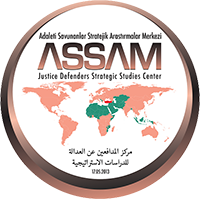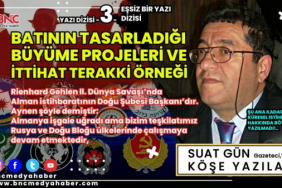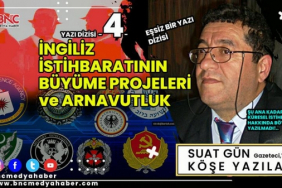
For over 40 years, Turkiye has been combating separatist terrorism, facing not merely a security issue but a complex proxy war orchestrated by global powers. Foreign actors, particularly those supporting terrorist organizations like the PKK both ideologically and logistically, have aimed to destabilize Turkiye, preventing it from rising to a global stature and nullifying its regional influence. Over the years, successive governments have adopted various measures – some periods relied solely on military suppression of terrorism, while others attempted negotiation processes. However, these approaches alone proved insufficient to eliminate the root causes of the problem.
Beginning in the 2000s, as global power balances shifted and under the leadership of President Recep Tayyip Erdoğan, Turkiye’s global vision expanded, giving rise to a more strategic and holistic counterterrorism approach. This new understanding was shaped significantly by the contributions of the late retired general Adnan Tanrıverdi, the founding president of ASSAM and then-Chief Advisor to the President. Under Tanrıverdi’s guidance, a new counterterrorism concept was developed – prioritizing the elimination of terrorism at its source, including cross-border operations. This approach moved away from traditional defensive reflexes, evolving into a multidimensional strategy that is proactive, intelligence-driven, inclusive of local actors, and reliant on international diplomacy.
This transformation aimed not only at operational success on the ground but also at dismantling the social, economic, and geopolitical roots that fuel terrorism. Another critical component in this process has been the significant progress in Turkiye’s defense industry. Since the 2010s, the increase in national and domestic production capabilities has given Turkiye a technological edge in the fight against terrorism while reducing foreign dependency and boosting operational confidence. Domestically produced platforms such as unmanned aerial vehicles (UAVs and armed UAVs), armoured ground vehicles, and precision-guided systems have been the cornerstone of field success. The effective use of systems like Bayraktar and ANKA has severely limited the mobility of terrorist elements and enabled pinpoint targeting in cross-border operations.
In light of all these developments, Turkey has adopted a strategy that does not remain on the defensive but proactively identifies and eliminates threats at their source – effectively ending terrorism. This new concept is significant not only for its military successes but also for showcasing Turkiye’s determination and independent action capacity within the global power balance.
Turkiye’s fight against terrorism has thus evolved into a multidimensional state policy – comprising national interest protection reflexes, domestic breakthroughs in the defense industry, and strategic thinking. This transformation, shaped by lessons from painful past experiences and a vision rooted in national will, has paved the way for the eradication of terrorism.
As a result of Turkiye’s multidimensional, resolute, and effective efforts, global actors who have long used terrorist organizations as proxies for strategic leverage have failed to achieve their desired outcomes. Particularly, cross-border operations, intelligence superiority in domestic security, national initiatives in the defense industry, and increased public awareness against terrorism have significantly curtailed these actors’ influence on the ground. Consequently, global powers have been compelled to withdraw support from the terrorist organizations they once used against Turkiye. The PKK, having lost much of its international support, has also lost its psychological upper hand – especially following MHP Chairman Devlet Bahçeli’s call for the terrorist leader to “unilaterally declare the end of terrorism and the dissolution of the organization”. Approaching its inevitable end, the PKK has entered a process of self-dissolution. This development is not merely the collapse of a terrorist organization but also a victory for Turkiye’s new security doctrine and strategy rooted in national will.
In the coming period, the complete dissolution of the PKK – which has already lost much of its operational effectiveness – will have implications beyond counterterrorism. For political structures that base their legitimacy and grassroots engagement on parallel rhetoric and association with the terrorist organization, this will trigger a severe crisis of legitimacy and representation. In this context, the DEM Party – regarded by the public as the political extension of the PKK – appears poised to face inevitable ideological and social exhaustion in the wake of the organization’s dissolution. This development will also affect the political balance shaped by the People’s Alliance and Nation Alliance and may lead to new fractures in voter behaviour and alliance politics. Therefore, the end of terrorism signifies not only a security achievement but also the beginning of a new era in Turkiye’s democratic, political, and social landscape.
Having endured a long and arduous struggle against terrorism, Turkiye now stands at a historic turning point. At the heart of this new era are decisive leadership and strategic commitment, achieved through great sacrifice. President Recep Tayyip Erdoğan, past and present members of the Presidential Cabinet, Nationalist Movement Party Chairman Devlet Bahçeli, relevant councils and commissions, and every patriot serving in security institutions have played critical roles in this success. The determined struggle carried out with such resolve has become a shared achievement – not only for Turkiye – but for the peace of neighbouring countries and for all humanity that values justice and global harmony. As a nation, we collectively feel deep gratitude and appreciation toward all architects of this historic stance, which has been etched into the annals of time and continues to secure peace on these lands.
Melih TANRIVERDİ
Chairman of the Board





